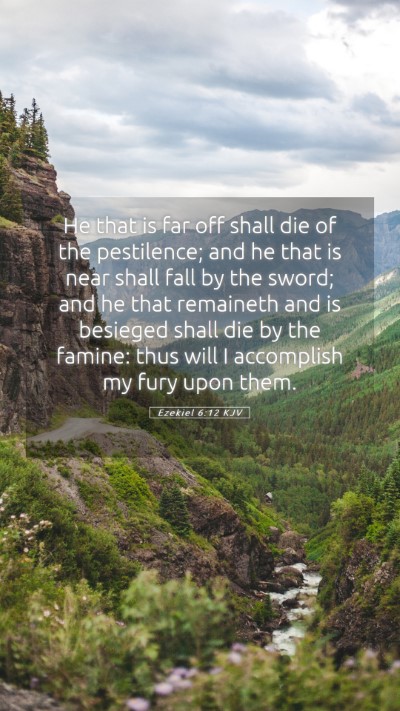Ezekiel 6:12 Bible Verse Meaning and Interpretation
Verse Reference: Ezekiel 6:12
The verse states: "He who is far away shall die of the pestilence, and he who is near shall fall by the sword; and he who remains and is besieged shall die by the famine. Thus I will spend My fury upon them."
Overview of Ezekiel 6:12
Ezekiel 6:12 presents a grim prophecy regarding the judgment upon Israel. The verse highlights the inevitable fate that awaits the people, underscoring the severity of God's impending wrath due to their idolatry and rebellion.
Commentary Insights
-
Matthew Henry's Commentary:
Matthew Henry emphasizes the distinct fates that are prophesied in this verse, noting that those who are distant from their homeland (far away) will succumb to pestilence, while those who are closer face violent death. This encapsulates the desperation and devastation that comes with divine judgment, illustrating that no one is safe from the consequences of sin. The use of pestilence symbolizes a slow, inevitable demise, contrasting with the immediate violence of the sword.
-
Albert Barnes' Notes:
Barnes elaborates on the context of this punishment. He indicates that the pestilence represents disease that afflicts those already far removed from the land, perhaps marking those exiled or captured. The sword that claims the near ones illustrates the violence of warfare, speaking to the turmoil within the nation. The famine faced by those besieged denotes a different form of suffering, one of deprivation and despair as resources dwindle. This multifaceted judgment serves as a warning against perseverance in wickedness.
-
Adam Clarke's Commentary:
Clarke adds further depth by analyzing the phrase "spend My fury." He interprets this as God unleashing His wrath fully, suggesting that the divine anger will not be held back. Each punishment serves as a tool for purification, meant to restore Israel through a fierce yet necessary event that highlights the consequences of turning away from God.
Theological Significance
This verse underscores several key theological themes:
-
Divine Justice:
It portrays God as a just figure who responds to Israel's unfaithfulness through proportionate punishment.
-
Human Sinfulness:
The verse reflects on the consequences of idolatry and spiritual neglect, serving as a reminder of collective responsibility for sin.
-
Hope Through Judgment:
While the verse depicts devastation, it also hints at eventual restoration that can follow repentance and recognition of God's sovereignty.
Application to Daily Life
The themes in Ezekiel 6:12 resonate beyond their historical context and arrive at practical application in modern life:
-
Reflection on Personal Conduct:
Believers are encouraged to examine their lives for areas of idolatry or neglect of God's laws and rectify these before facing dire consequences.
-
Understanding God’s Nature:
Recognizing God's justice and mercy allows individuals to embrace accountability while also holding onto hope for redemption through sincere repentance.
-
Encouragement for Community:
This verse prompts communities of faith to engage in collective responsibility and prayer for restoration and alignment with God’s will.
Cross References
Ezekiel 6:12 can be understood better when viewed alongside the following scripture passages:
- Ezekiel 5:17 - Discusses similar judgments faced by Jerusalem.
- Jeremiah 44:13 - Aligns with themes of punishment and judgment in Judah.
- Lamentations 2:20 - Reflects on suffering and desolation due to sin.
Conclusion
In summary, Ezekiel 6:12 serves as a powerful reminder that God’s judgment is inevitable for those who stray from His commandments. The insights from the public domain commentaries underscore the multifaceted nature of divine retribution, allowing for a deeper biblical exegesis that enhances our understanding of scripture. Through diligent Bible study and engagement with these teachings, individuals can find both conviction and hope in God’s word.
Further Study Recommendations
For those interested in exploring additional insights, here are some suggested study topics:
- Understanding the historical context of Ezekiel and its relevance today.
- In-depth study of Old Testament prophecies and their implications.
- Examining how idolatry manifests in contemporary society and its consequences.


